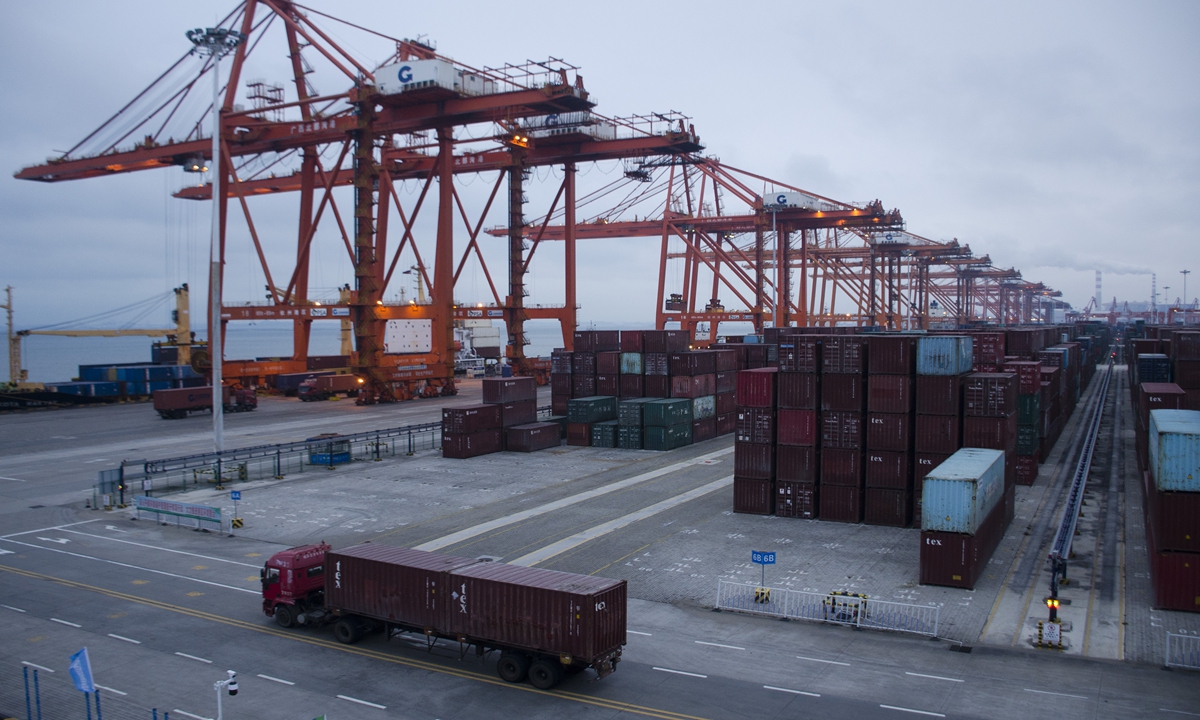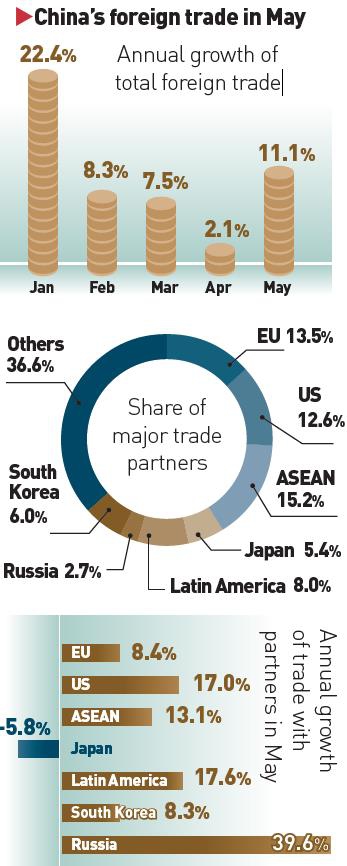
Photo taken on January 10, 2022 shows the container terminal of Qinzhou Port in Qinzhou, South China's Guangxi Zhuang Autonomous Region. Qinzhou vowed to build itself into a China-ASEAN trade and cooperation center and to be open to navigation to major ports in the world. Photo: VCG
Chinese official data showed on Thursday that China's exports to the US continued to expand at a faster speed in May, even as China battled the most severe COVID-19 outbreak in the country, underscoring the resilience of China's export sector as well as the US' reliance on Chinese imports despite Washington's politically charged attempt to decouple from the world's biggest trading nation.
Robust growth in Chinese exports to the US during the period was also fueled by short-term positive factors such as a recovery of retail sales in US, which pushed up demand for Chinese-made products, according to analysts.
In the first five months, China's exports to the US surged by 12.9 percent year-on-year to 1.51 trillion yuan ($226.2 billion), compared with a 12.6 percent growth in the first four months, according to Chinese customs data. In comparison, China's imports from the US rose slightly by 2.1 percent to 489.3 billion yuan from January to May.
During the period, China's trade surplus with the US reached 1.02 trillion yuan ($153 billion), up 19 percent on a yearly basis and expanding from 654 billion yuan in the first four months of this year, according to the customs data.

China' foreign trade in May 2022 Graphic: GT
These divergences provide a vivid reflection of the two countries' trade structure, as the US relies more on Chinese products, mostly daily articles, than China relies on imports from the US, which are mostly high-tech products and technologies, experts stressed.
Bai Ming, deputy director of the International Market Research Institute at the Chinese Academy of International Trade and Economic Cooperation, said that US restrictions on certain exports to China, such as chips, contributed to its trade gap with China.
"It's normal and inevitable for China's trade surplus with the US to increase, as Chinese products have an enduring appeal in the US. It also shows that Chinese goods' position in global supply chains is firm, and it's impossible to decouple China's industries from those of the US," He Weiwen, a senior research fellow from the Chongyang Institute for Financial Studies at the Renmin University, told the Global Times on Thursday.
Some experts cited some short-term factors for the fast growth in Chinese exports to the US. Zhou Maohua, a macroeconomist at Everbright Bank, told the Global Times on Thursday that US consumption has strengthened recently, which has been driving up demand for imported goods.
Retail sales in the US rose 0.9 percent in April from March, marking the fourth straight month of higher retail spending, according to the US Commerce Department.
Experts forecast that China's trade with the US might continue to surge in the coming months, especially as US officials are sending signals about possible removal of additional tariffs on Chinese goods.
US Treasury Secretary Janet Yellen recently said the Biden administration was considering ways to reconfigure tariffs on Chinese goods as a means of helping ease decades-high inflation, the Wall Street Journal reported on Wednesday.
According to He, the Biden administration might relax tariffs on normal daily articles, but restrictions on products with high technological values or those enjoying policy support might get even tougher.
However, he said that the Biden administration's measures against high-tech products traded between China and the US will face some difficulties, as China makes a lot of intermediate products needed by US high-tech industries.
Zhou said that if the US government scraps the additional tariffs on Chinese goods, it will save money for American consumers and help reduce US inflation.
"Scrapping the tariffs will both benefit China's exports to the US and drive up domestic demand for US goods," Zhou said. "It will also help lower trade resistance between the two countries and stabilize the two countries' industry and supply chains."
Bai said that tariff changes will depend on the US inflation rate, which may compel the US government to act.





